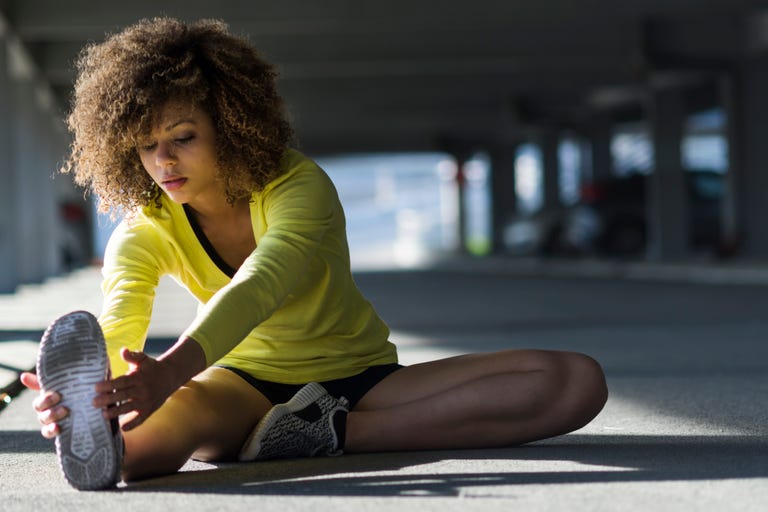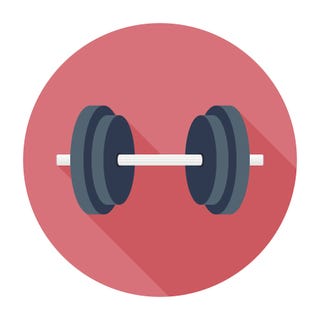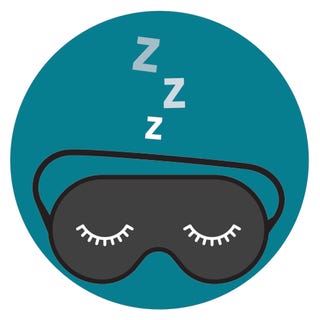How To Prevent—And Deal With—Post-Workout Muscle Soreness

Whether you skipped a few days (okay fine, a few weeks) at the gym before making your triumphant return or decided to try out a new HIIT class instead of your usual yoga routine, you may have experienced that dreaded muscle soreness 24 hours later. (Yeah, as in, even putting on your shoes or standing up from the couch made you groan.)
FYI: What you’re feeling is officially known as DOMS, or delayed-onset muscle soreness. “[DOMS] is basically the result of microtrauma to the muscle and surrounding tissue that provokes an inflammatory response,” says Rachel Straub, M.S., a certified strength and conditioning specialist and co-author of Weight Training Without Injury, “which inevitably increases the perception of pain.”
The good news: the aches and pains are fleeting—it typically takes less than a week to go away, says Straub. But you can generally avoid post-workout muscle soreness by taking the right precautions.

Getty Imagesilyast
How to prevent muscle soreness
Some people live for the ache of DOMS to prove that they actually worked their ass off during a workout. But instead of focusing on pain to prove your success—since it could mean you’re not giving your body enough time to build up to your fitness goals—focus on the fact that you’re slowly but surely able to lift more weight or run for longer without getting winded, says NASM-certified personal trainer James Shapiro.
Try these strategies to limit post-workout soreness:
1. Up your intensity gradually. If you work out longer and harder AND boost the intensity of your workout each time, DOMS becomes somewhat inevitable, says Straub. Instead, make things more challenging little by little. If you’re lifting weights, for example, opt for either moving up in sets and reps with lower weights, or increasing the weight but not the reps. “Upping the intensity slowly will help keep muscle soreness to more tolerable levels,” notes Straub.
And if you’re sore all the time, consider adding in another rest day, recommends Shapiro.
2. Listen to your body—not your workout buddy’s. You and your workout buddy may be #swolemates, but that doesn’t mean you have identical fitness abilities and experience. You might get sore, while your friend feels totally fine, says Straub. Frustrating, right? Consider this your friendly reminder to listen to your body when exercising and not someone else’s, she recommends.
3. Give your body some TLC. Don’t neglect to pamper those hard-working muscles. Use a foam roller and stretch after your workout, recommends Shapiro.

That said, don’t use this as an excuse to halt all movement—or take a multi-day Netflix-and-chill break. “Activity seems to speed recovery, while inactivity seems to delay it…or at least make you more aware of it,” says certified personal trainer Cary Raffle. So try making active recovery—like taking a long walk or yoga class—a regular part of your routine.
4. Don’t skip the cool down. “Studies show that performing 10 minutes of low-intensity cardio is on level with self-reports as a stretching session,” says Shapiro. This could mean a jog that’s slower than your usual running pace, pedaling on a stationary bike at an easy clip, or even walking on the treadmill.
5. Stretch before bedtime. Remember how a lack of movement ups DOMS? Well, unless you really toss and turn throughout the night, shuteye equals remaining still AF for an extended period of time. “Stretching prior to sleep can improve blood flow, which aids in the delivery of nutrients to damaged areas,” Shapiro adds. Try some classic yoga stretches like forward fold, seated twist, or downward dog right before you head to bed.

Getty Images
How to treat muscle soreness
Sometimes, it just can’t be helped—a class is a notch harder than expected, or you amp up your workout’s intensity a bit too dramatically. And that can leave your muscles groaning.
Try these tips to rid yourself of the ache:
1. Rest sore spots—but don’t skip exercise entirely. There’s a reason people alternate between leg and arm days. “Most muscles require 48 to 72 hours to recover,” says Straub. Sore glutes? Wait a few days to do the routine that got them aching, she recommends. The consequences of skipping a break can be serious. “If you do not give the muscle sufficient time to recover, you can strain that muscle (which can put you out for weeks, or even months),” says Straub.

But don’t let muscle soreness stand in the way of your workout: Again, continued exercise is one of the best treatment for DOMS. “If you are sore, exercise helps increase blood flow which removes waste products and increases endorphins,” says Straub.
The key is to dial down the intensity on your go-to workout so that you stay moving but don’t push your muscles too much, she advises.
2. Heat it up. In the past, most fitness professionals recommended RICE (rest, ice, compression, and elevation) as the best way to east post-workout muscle soreness, explains Shapiro.

But now, the experts are recommending heat therapy instead since it can increase circulation, which brings oxygen and nutrients to damaged tissues, explains Shapiro. So go ahead and grab that heating blanket or take a hot bath to ease your aching muscles.
3. Give your body the right fuel. You already know that what you eat after a workout matters, but you may not have known it affects your soreness level, too. “Consuming protein and carbohydrates immediately after exercise can help repair any damaged muscle,” says Straub since it provides the amino acids and glucose needed for protein synthesis (a.k.a. muscle building). Need some fuel inspo? Try these seven high-protein snacks post-workout.
Source: Read Full Article
